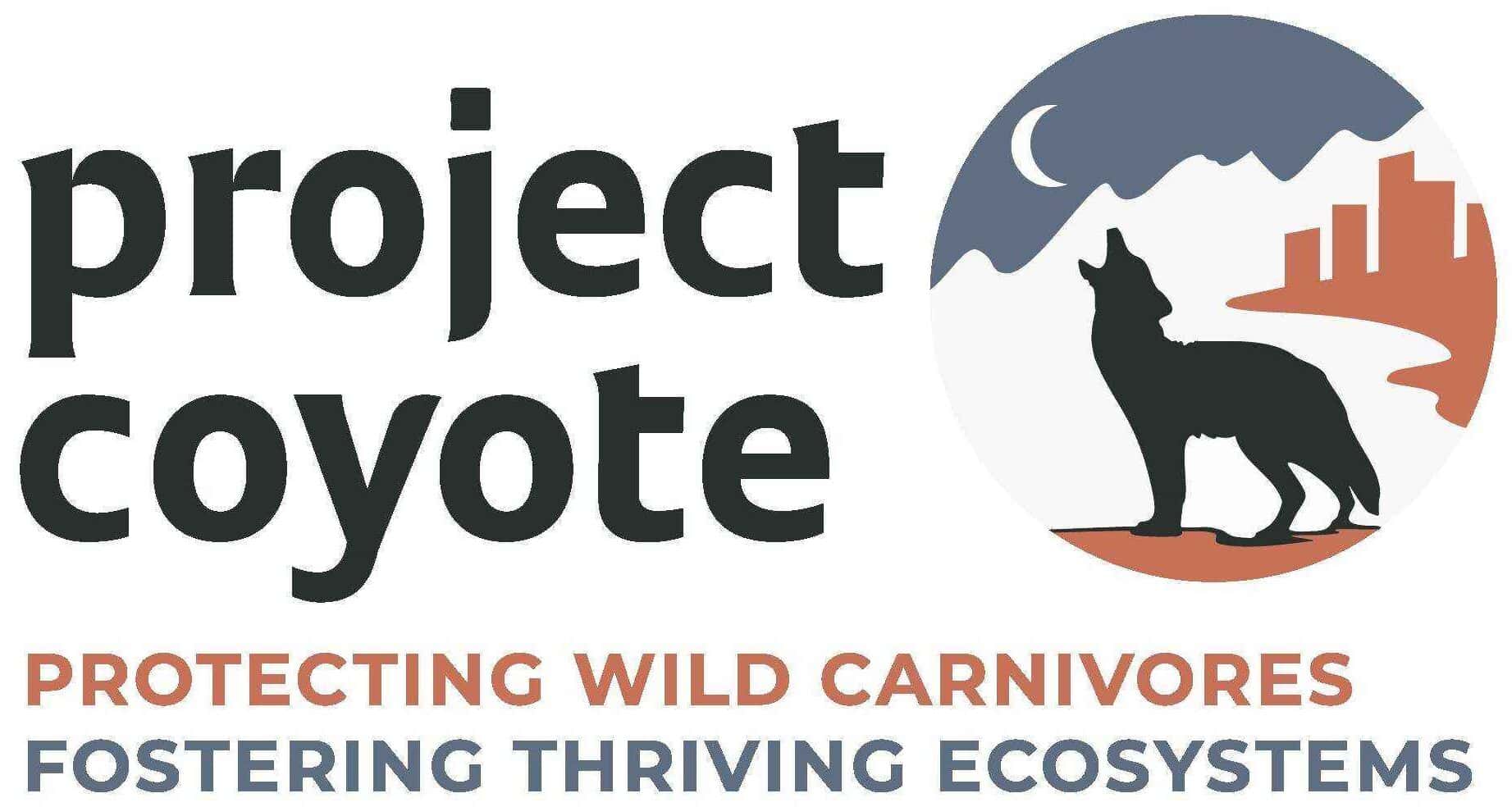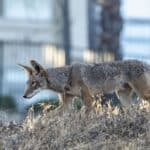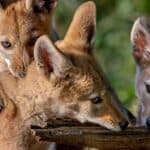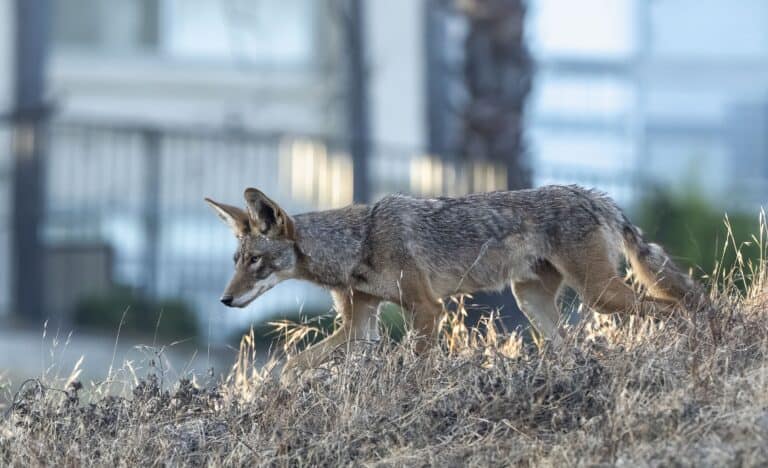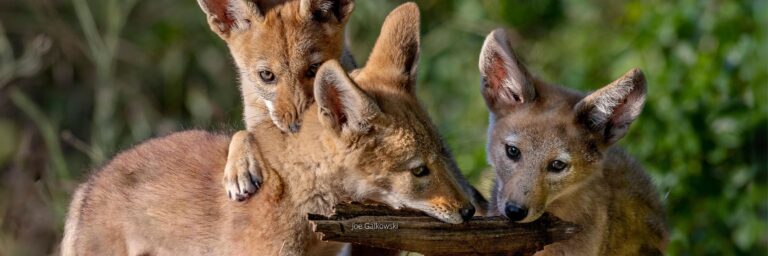Notes From The Field Blog By Francisco Santiago-Ávila, Project Coyote Science & Ethics Manager
Where do the disappeared go?
Search in the water and in the bushes
And why do they disappear?
Because we are not all the same
And when does the disappeared return?
Every time the thought brings them
How do you speak to the disappeared?
With emotion squeezing inside
– Desapariciones (Disappearances), Rubén Blades & Seis del Solar
If you have been tuned into recent wildlife news, you are likely aware of the disturbing incident that occurred in the town of Daniel, WY, last February, where a 42-year old man injured, tortured for hours, and later killed a young female wolf. According to reports, the individual pursued a wild wolf with a snowmobile until she was exhausted, grievously injured her by running over her with his vehicle, captured her, restrained her muzzle with duct tape, took her to his residence and hours later exhibited her at a bar in Daniel, where she was subject to degrading behavior for photos and videos. Subsequently, he took her outside the bar and killed her – it remains unconfirmed if shot or bludgeoned. The individual responsible only paid a fine of $250 for the illegal possession of a warm-blooded wild animal. There were no charges or penalties related to the most egregious acts he committed: persecuting, torturing and killing an animal, for nothing other than recreation.
At Project Coyote, we are profoundly saddened by the incident and deeply empathize with the wolf. We imagine the life she should have experienced that day: waking up in a beautiful landscape, safe among family, feeling healthy and rested, looking forward to the day. She would have stretched, yawned, yipped and howled. She would have played with, greeted, nuzzled, and licked her family. She would have practiced coordinating with her family to obtain food and, if successful, had a satisfying meal and rest in the snow afterwards – looking forward to not just surviving, but enjoying life. We can only imagine what she went through instead: being persecuted and severely injured, and experiencing the fear and distress of being completely overpowered, helpless, dispirited, at the mercy of other beings that dismiss you and interact with you as if the reason for your existence was their recreation.
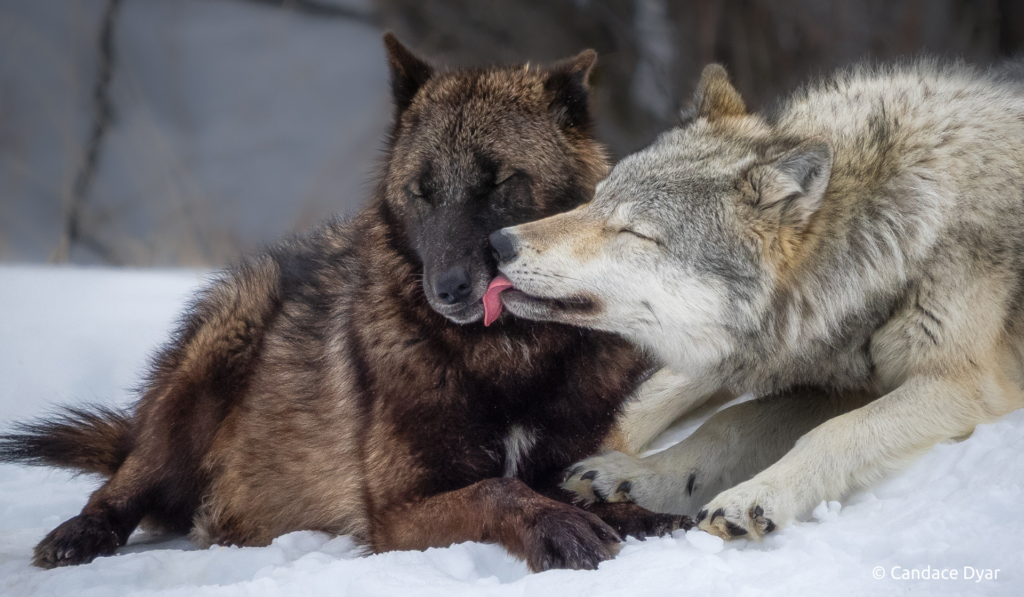
Gray Wolves sharing a tender moment | photo courtesy of Candace Dyar
We think about her family as well: how much they love her; their painful howls echoing through the landscape searching and wondering where she is after her disappearance; how much they miss her after she never returned that day, or the day after, or the day after that; how hard it must be to move on with their lives; how their lives may have changed without her (research shows that, similar to humans who lose family members, killing pack members affects their family dynamics). Maybe some of her family witnessed the incident, or maybe they’ll never know what happened. Maybe some of them have already ‘disappeared’ as well. None of these experiences should be misconstrued as ‘anthropomorphism’ – just like as humans, scientific evidence asserts that wolves, coyotes and many other animals have the necessary conscious, cognitive, emotional and social capabilities (among others) to experience all of the above, and we know social animals establish fierce affective bonds with their families, and mourn their loss. Yet, in debates over wild animal treatment, the suffering of those loved ones who remain alive, widowed, orphaned or alone is rarely, if ever, considered.
The song quoted above (originally in Spanish) is famous throughout Latin America. In it, Panamanian artist Rubén Blades narrates the experiences of everyday individuals affected by Latin American dictatorships, focusing on the experiences of the “disappeared” and their loved ones. The resemblance to what many wild animals experience in the US, especially predatory animals, demands reflection. It comes to mind every time I see pictures of the rampant persecution, abuse and killing of wildlife that goes unchecked and sanctioned by tyrannical government agencies, who dismiss animals and sacrifice them for whatever it is humans desire.
We at Project Coyote unequivocally and emphatically condemn the persecution, torture and wanton killing of this wolf, and any other animal treated in such a way. We also feel it necessary to take this opportunity to explore what social and institutional circumstances allowed this to happen, so as to identify the necessary changes that may lead to the institutionalization of compassion and justice for wild animals that would prevent such incidents from happening again or going unpunished. My intentional omission of the name of the individual that committed the atrocious acts in Wyoming is solely to highlight the systemic nature of this abuse.
Unscientific and unethical wildlife policy
In Wyoming, wolves and coyotes are classified as “predatory animals”, meaning they have no protections whatsoever against recreational persecution. In fact, reports on the practice of coyote ‘whacking’ (running down and over coyotes, the most common target, with snowmobiles) show the practice has been common, known and accepted in Wyoming and elsewhere for years.
We join other advocacy groups in highlighting that the lack of policies and regulations addressing this type of behavior towards wild animals makes all decision-makers – legislators, governors, wildlife boards/commissions and agency staff, complicit in the pervasive abuse of many wild animals. We also feel the need to stress that this ethical relativism and the permissiveness of abusive behavior towards wild animals, and predatory animals especially, is pervasive throughout the US, as are the worldviews that underlie both the behavior and its allowance (even its promotion) by both state and federal agencies.
There are deep, institutionalized misunderstandings that prevent a transparent, inclusive conversation about our treatment of wild animals, and about what should be considered compassionate and fair in our relationships to them. Such misunderstandings and worldviews preclude any increases in protections for wild animals.
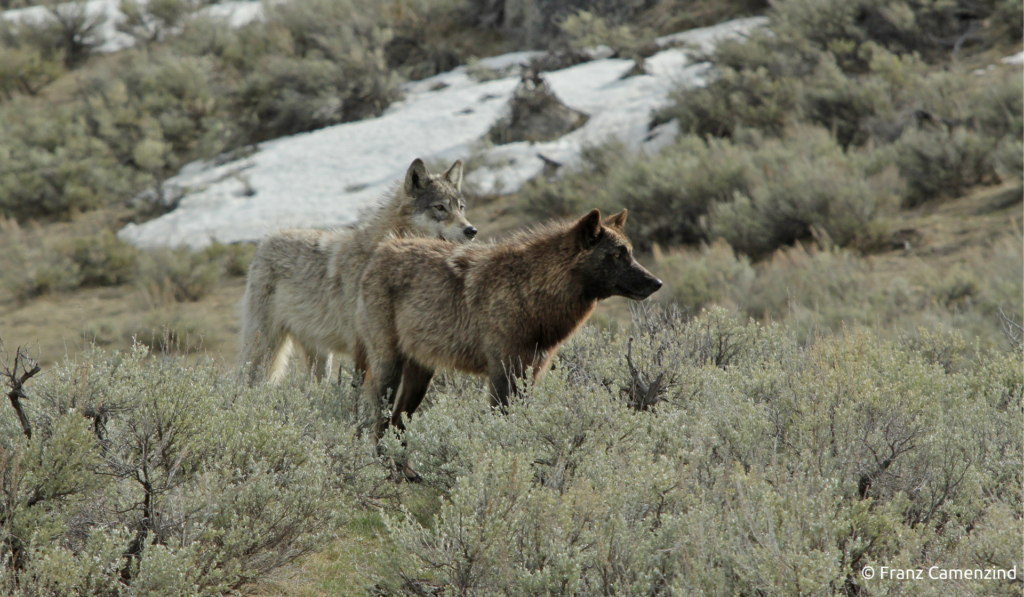
Gray Wolves | photo courtesy of Franz Camenzind
Wildlife agencies at the state and federal level generally promote an unscientific and unethical view of wild animals as valuable only for what they can provide to humans. Despite claiming they follow scientific evidence, wildlife agencies create mandates, policies and ‘management’ plans that consistently omit any mention of the science acknowledging animals as conscious, feeling beings that value their lives and wellbeing. Such dismissal of the internal qualities and lives of animals is not benign. By refusing to acknowledge animals as beings with their own lives and interests, agencies objectify them, turning them into ‘natural resources’, sponsoring and sanctioning their ‘use’ for whatever humans want, including torturing and killing them for recreation – likely the most trivial of reasons for harming another living being (whoever that being may be). This means that the violence against wild animals begins within our institutions, making agencies fully complicit in the pervasiveness of the abuse towards wild animals.
As examples, notice the sanitized language the WY Game and Fish Department (WGFD) spokesperson used when describing the incident: they noted that the culprit was “out hunting”, then “pursued” (i.e., persecuted), “harvested” (severely injured, captured, restrained) and “euthanized” (killed, since it was not done humanely) the wolf. This is common and misleading language used by agencies nationwide when referring to the harming and killing of wild animals. Similarly, coyotes are generally referred to in some states as “varmints”, “nuisance” or “pests” – all invidious and bigoted terms that increase their dismissal, including the acceptability of harmful and lethal interventions towards them.
Undemocratic and dangerous worldviews
To add to this unscientific, unethical view of wild animals, agencies charged with mediating our relationship to wild animals and the natural world generally restrict themselves to concerns over population(s) or species as the only salient metrics of whether such a relationship is appropriate (i.e., ‘ethical’) or not. What’s worse, there is an unyielding refusal by wildlife agencies to consider the wellbeing of individual animals (this is especially pronounced for animals of species misrepresented as problematic, such as predators), leading to managers ignoring barbaric acts like the incident in WY and to lack of institutional support for, or direct opposition to, establishing laws that prohibit cruelty towards wildlife. Given this unscientific, relativistic view towards animals, some states actively avoid having official positions on issues of treatment of wildlife, as exhibited by the WGFD spokesperson when asked if they believe ‘whacking’ is unethical, or by the Illinois DNR when we petitioned to make wildlife killing contests illegal in the state (they decided to leave the matter to the legislature and did not take a position on the bill since, allegedly, some agency staff and managers partake in such contests).
On the federal side, the US Fish and Wildlife Service (USFWS), responsible for managing imperiled species under the Endangered Species Act, endorsed Wyoming’s contentious policies. Before delisting wolves, the federal agency had to approve the state’s management plan, making the former complicit in the latter’s allowed practices against wolves. The USFWS just reaffirmed their approval of Wyoming’s “existing regulatory mechanisms” with the decision not to relist western gray wolves as endangered. Moreover, federal and state agencies have done their best to ignore or dismiss scientific evidence from multiple studies noting that reducing protections for contentious species like wolves does nothing to increase humans’ tolerance of them (it may even decrease it), and may even devalue the individual animals, emboldening abusers and killers, and increasing rates of poaching.
Coyotes and their treatment by state agencies provide a window to what happens when populations of a predatory animal are of no conservation concern. Despite being described on many state agency websites as playing important roles in ecosystems, coyotes are seldom provided any protections whatsoever by state wildlife agencies – and such lack of protections extends in some form to many other mesopredators, including foxes, raccoons, striped skunks, opossums, muskrats and others. In most states, there are no limits to how many coyotes someone can kill, no closed seasons (i.e., year-round) or time restrictions (including night-hunting), no reporting requirements, and the allowed methods for killing them are incredibly liberal, allowing the use of electronic calling, baiting, sights/scopes, night hunting with lights, light color, vehicles and dogs. Such permissive regulatory frameworks are what allows and contributes to some individuals’ participation in completely unregulated wildlife killing contests in most states; anyone can satiate their appetite for recreational killing as long as they adhere to the (lack of) regulations.
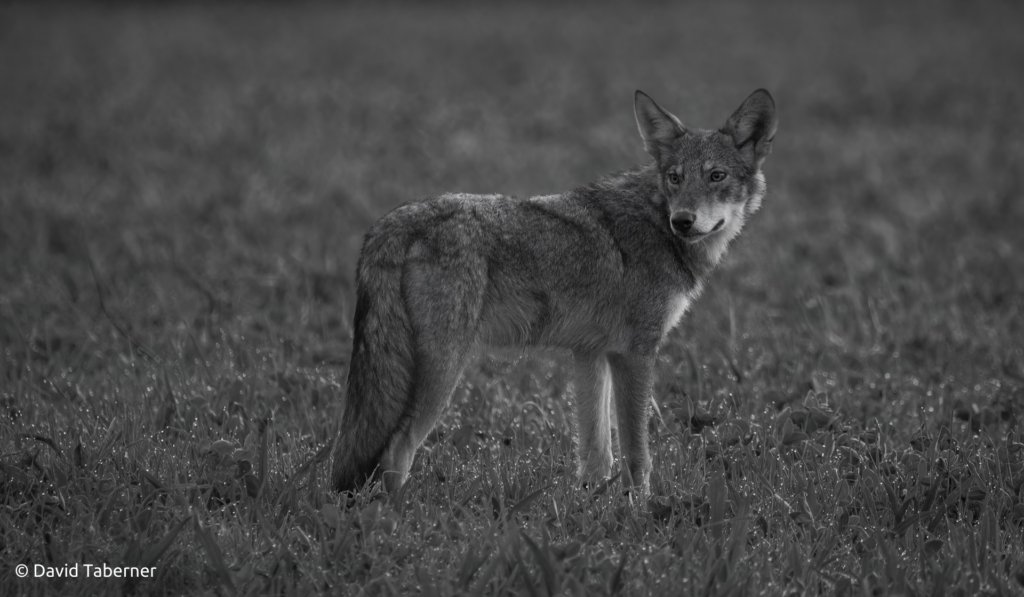
Eastern Coyote | photo courtesy of David Taberner, #CaptureCoexistence Contributor
In our experience, the general public does not know this side of wildlife policy, and agency managers and wildlife commissions are more than happy to keep it that way. Wildlife agencies have been captured by undemocratic and dangerous worldviews that mediate our relations with wild animals and nature. They habitually cater to narrow special interest groups, i.e., animal agriculture and hunting, with specific interests in appropriating landscapes and/or killing wild animals. The animal agriculture industry especially contributes to cruelty toward wild carnivores through vilification and constant calls for increasingly liberalized killing. The agency capture by such interests is incentivized by the economic relationship between hunting/trapping license buyers and the agencies, which are funded in part through the selling of said licenses and so feel compelled to satisfy their demands. Both interest groups habitually promote unethical, selfish worldviews prejudiced against the intrinsic value, wellbeing and lives of wild animals.
These unethical worldviews enshrined in public agencies stand in stark contrast to those of the broad public, who increasingly value wildlife alive and as part of their social community. As an example of such agency capture, while you can torture wolves and coyotes in WY, ‘big game’ species in the state are protected against cruelty. Whereas in New Hampshire, recreational predator hunters and trappers held enough influence to block a measure that would have prevented the hunting of coyotes during their pup-rearing season, despite no other hunted species in the state being subjected to year-round open season or being legally hunted during the period when their offspring are reared. The influence of such groups is so strong that some state agencies like the Wisconsin DNR are educating trappers on how to portray the activity online as a wholesome tradition, despite the cruelty and suffering experienced by the victims.
Such agency capture is often codified in policy, as many managers and members of wildlife policy bodies (such as wildlife commission members) are required to be part of hunting and agriculture constituencies. Moreover, this institutionalized agency culture seems to have created a self-selection process for wildlife professionals. Scientific studies note wildlife agency staff hold more dominating views of our relationship to wild lives than the broad public. Another study found agency scientists generally support lower protections for Grizzlies than non-agency scientists. Ask yourself (as I did when I started looking for jobs after my PhD): if you truly care for and respect wild animals as individuals with intrinsic value, would you choose to work for an agency promoting values you oppose but which you must uphold? I certainly wouldn’t, and I’m not the only one. This is an incredibly concerning self-selection process that continues to reproduce a dangerous and undemocratic agency culture that reflects the values of powerful minorities rather than those of the broad public.
Not all hunting is equal or ethical
In the aftermath of the WY incident, PC has joined dozens of conservation organizations in “urging the U.S. Forest Service and Bureau of Land Management to immediately prohibit the use of snowmobiles or other vehicles to run down, injure or kill wildlife on all federal lands they manage.” And yet, we assert that we should not limit our advocacy for wild animals to either conservation concerns over populations or to only challenging the methods that are used to harm and kill them for whatever motive. Hunting and hunters are not a homogeneous group, and not just the methods employed, but the motivations for engaging in the killing of wild animals deserve much higher ethical and scientific scrutiny by the public.
At Project Coyote, our values are emphatically opposed to the harm and killing of wild animals for recreation, regardless of the means employed. We firmly believe that “recreation” can never be the justification for the taking of another life. It is appalling that recreational killing is considered a sport, dismissing the harm done to animals, and for such a trivial purpose. No killing, including for subsistence, should ever be considered a sport. Depicting hunting as a competition or skill intentionally diverts attention from the always grave act of killing, ignoring the victims. The pride individuals take in that misnomer, calling themselves ‘sports(wo)men’, is unfortunate and disgraceful. It even seems disingenuous to suggest ‘fair chase’ is possible with recreational killing: since the animal’s claim (life and wellbeing) will always be more urgent and vital than the hunter’s claim (recreation) – therefore the (motivation for the) chase can never be considered ‘fair’. In both conservation and animal advocacy, we should be actively challenging that type of disrespectful language, rather than acquiescing to it.
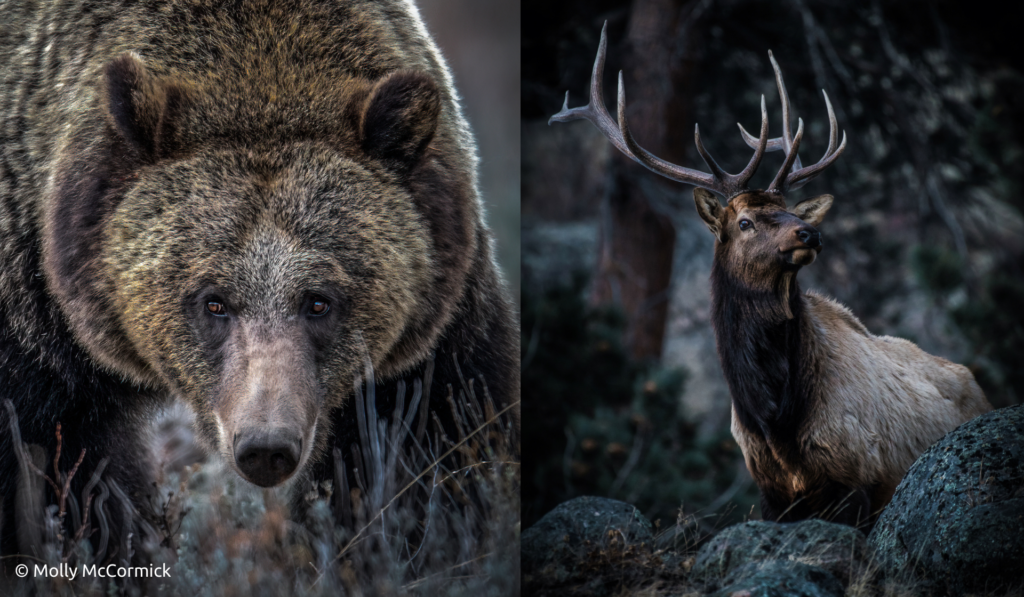
Bear and Elk | photos courtesy of Molly McCormick, #CaptureCoexistence Contributor
Subsistence hunters should heed such nuanced descriptions of hunting and its motives, and advocacy organizations should start nuancing their messaging accordingly. Instead of constantly identifying themselves as generic ‘hunters’ and fearing for the future of all hunting, as if all hunters had the same motivations, subsistence hunters should emphasize the difference between them and wanton killers, and explicitly oppose recreational killing. They should stop caving to the usual red herring ‘slippery slope’ arguments promoted by recreational killers that all hunting is at stake. Otherwise, they are (and have been) allowing recreational killers to manipulate them into complicity with their activities.
Towards care and respect for wild animals
While some vocal ranchers/farmers and recreational hunters denigrate and abuse wild animals with the consent of wildlife agencies, much of the public seems divorced from wildlife issues – neither educated about nor paying attention to them. As if the continued suffering of these vulnerable and voiceless beings was not reason enough to intervene on their behalf, these are also beings who contribute immensely to our wellbeing simply through their autonomy and agency. Wild carnivores regulate ecosystem processes and provide benefits that contribute greatly to the flourishing of our multi-species communities. Abdicating to ranchers/farmers and recreational hunters the responsibility to regulate our relationship(s) to wild animals is harmful to us all.
The worldviews promoted by these groups single out beings as outside the sphere or ethics and justice given an arbitrary difference they choose to devalue, and it does not stop at ‘not being human’. Research reveals profound philosophical and psychological connections between dismissals of animals and marginalization of humans, including racism, sexism, homophobia, ableism, and social dominance orientations like right-wing authoritarianism, highlighting underlying psychological tendencies towards hierarchies and exclusion. Put simply, violence perpetuates violence, and those who engage in violence rarely limit their targets to a single species. Numerous studies have shown a direct link between abuse toward animals and violence toward humans, this is commonly referred to as “The Link.” The Link shows a need for an intersectional approach to address cruelty to animals, violence toward humans, and the underlying systems that allow these harms to occur.
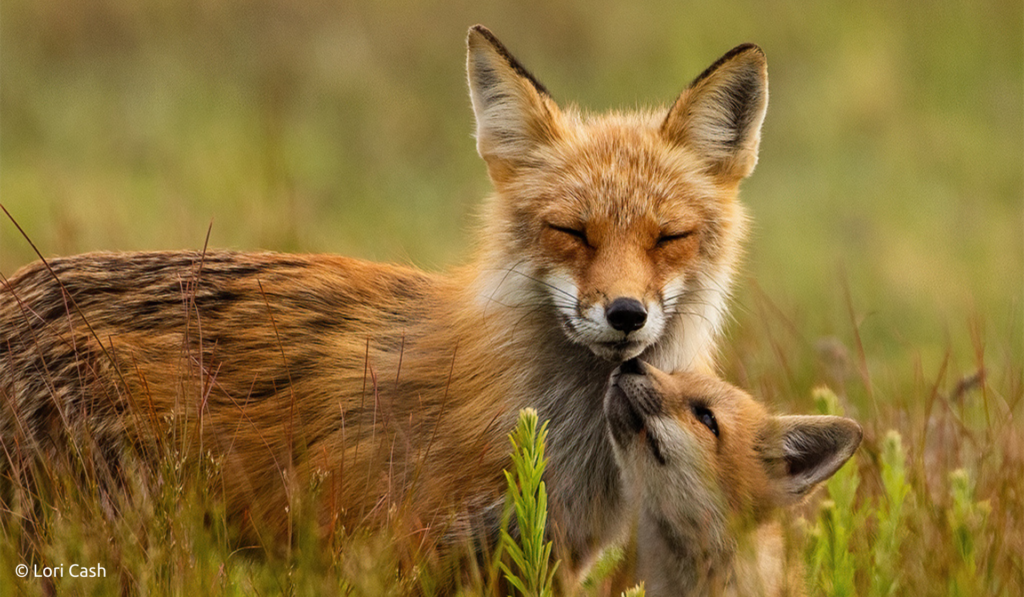
Red fox mother with her kit | photo courtesy of Lori Cash, #CaptureCoexistence Contributor
Worldviews dismissive of other beings stem from the privileging of arbitrary qualities (e.g., being human, or white, or male) and involve the devaluation of differences and the dismissal of shared elements like life, consciousness, wellbeing, agency, and interdependency. Recognizing these intersections is crucial for addressing systemic injustices and promoting social equality by informing strategies to combat both animal and human oppression. For example, if the persecution, killing, and public display (common with ‘whacking’ and recreational killing) of any human individual based on any of those differences is considered a ‘hate crime’, the same seems true of recreational hunting. By allowing the dismissal of animals, not only do we fail in our responsibilities towards them, we also embolden the interspecies rationale of harmful marginalization and exclusion.
To effectively advocate for wild animals, we require heightened support — direct, vocal, outraged, and unyielding. It is imperative to increase awareness, educating others about the significance of animal and environmental protection, and why the current status quo permits rampant animal abuse and slaughter. Engagement with the broad public is crucial; we need everyone to actively participate by voicing their concerns to agencies, boards/commissions, and legislators, urging for stronger safeguards and the prohibition of recreational killing rather than just specific methods. We need to be firm in challenging unethical activities such as recreational hunting and trapping, which serve trivial or unethical purposes like entertainment or ‘tradition’ – we have done away with many traditions deemed unethical, be them towards humans or animals. We need to demand robust ethical and scientific justifications for any actions that may harm animals. We also need to advocate for a comprehensive overhaul and democratization of wildlife decision-making bodies and processes that currently prioritize a small subset of special interests promoting recreational killing. We should demand changes in mandates and wildlife “management” plans that incorporate the latest scientific understanding of animal sentience, cognition, and wellbeing.
It is essential to recognize what’s at stake here: not just the lives and wellbeing of wild animals, but our relationships with them and, consequently, the overall wellbeing of our diverse multi-species communities. We need to do better, and we will not falter. We can think of no better way to honor all the disappeared, and all the bonds that have been broken, than to work towards dismantling this tyranny over wild animals.
